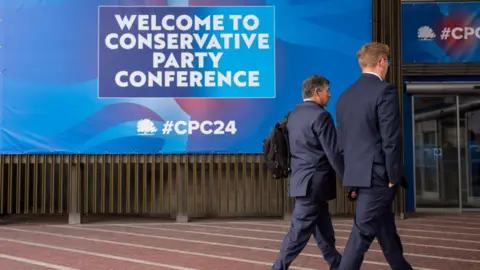Conservatives to set out plan for £47bn of cuts to public spending
27 minutes agoKate WhannelPolitical reporter

 Getty Images
Getty ImagesThe Conservatives will set out proposals later on cutting public spending on welfare, aid and civil servants which the shadow chancellor will say would save £47bn over five years.
Sir Mel Stride is expected to say in his speech to the party’s conference in Manchester that there is “no more pretending we can keep spending money we simply do not have”.
Proposals include stopping welfare claims for people with “low level mental health problems” and reducing the number of civil servants by around 132,000, a reduction of around a quarter.
Sir Mel will also say his party would reduce aid spending by £7 billion to 0.1% of national income.
The conference in Manchester marks almost one year since Kemi Badenoch was elected party leader.
In the last 12 months, the party has struggled to counter the political threat posed by Reform UK and suffered heavy defeats in this year’s local elections.
During their conference, which began on Sunday, the Conservatives are hoping to portray themselves as more competent and more credible – particularly on public spending – than their political rivals.
In his conference speech, Sir Mel will say: “We must get on top of government spending.
“We cannot deliver stability unless we live within our means.
“We’re the only party that gets it. The only party that will stand up for fiscal responsibility.”
His proposals include saving:
- £23bn from the welfare bill
- £8bn by bringing civil servant numbers from 517,000 down to 2016 levels of 384,000
- £7bn from the overseas aid budget
- £3.5bn by ending the use of hotels to home asylum seekers
- £4bn by ensuring benefits and social housing are reserved for UK nationals
- £1.6bn by scrapping environmental policies, including cutting subsidies for heat pumps and electric vehicles.
Earlier this year, the Labour government sought to cut nearly £5bn from the disability and health-related benefits bill but had to backtrack after a rebellion by its own MPs.
Work and Pensions Secretary Pat McFadden has suggested the government will return to the issue, telling the BBC that changes to the welfare system “must happen”.
Last year, the Office for Budget Responsibility forecast that total spending on health and disability benefits would rise from £64.7bn in 2023-24 to £100.7bn in 2029-30.
The Tories argue they can reduce the bill by reviewing exemptions for the Household Benefit Cap, limiting the VAT subsidy for Motability – which allows claimants to lease vehicles – and changing obligations for job-seekers.
It says it would stop claims for people suffering from “low-level health” mental health problems arguing that “what is really needed is treatment and support, not cash”.
It also says it would keep in place the two-child benefit cap, which prevents households on universal or child tax credit from receiving payments for a third or subsequent child born after April 2017.
The Labour government has been under pressure to remove the cap, with many of its backbenchers arguing the limit has increased the number of children in poverty.
The Resolution Foundation says axing the cap would lift 470,000 children out of poverty and would cost around £3.5bn.
Badenoch has previously defended the cap saying it was a matter of “fairness” and Conservatives believed people on benefits “should have to make the same choices on having children as everyone else”.
Earlier this year, Prime Minister Sir Keir Starmer said he would cut the UK’s aid budget from 0.5% of gross national income to 0.3% in 2027 in order to pay for an increase in defence spending.
The Conservatives say further reducing spending to 0.1% would save nearly £7bn.
Currently, a portion of the existing aid budget is used to pay for hotels to accommodate asylum seekers.
The Institute for Economic Affairs (IEA) think tank welcomed some of the proposals but warned the Conservatives not to ignore “elephant in the room” of age-related spending such as pensions.
Tom Clougherty, IEA executive director, said: “Ultimately, no political party is going to be able to balance the books only by cutting things their supporters don’t like.
“Without that, other cuts are likely to amount to running to stand still.”
The Conservatives have not committed to changing the triple lock, which guarantees that the state pension will go up each year in line with either inflation, wage increases or 2.5% – whichever is the highest.
Romilly Greenhill, chief executive of Bond, the network of international development organisations, said the proposed aid budget cuts were “reckless, short-sighted, and morally indefensible”.
The Conservative conference comes six weeks before Chancellor Rachel Reeves delivers her Budget on 26 November.
During the election, Labour promised not to increase income tax, National Insurance or VAT for working people.
However, there has been speculation that Reeves will need to raise taxes in order to meet her self-imposed rules for public spending and debt.
In a report in March, the Office for Budget Responsibility said the chancellor only had a “very small margin” – £10bn buffer – in which to operate.